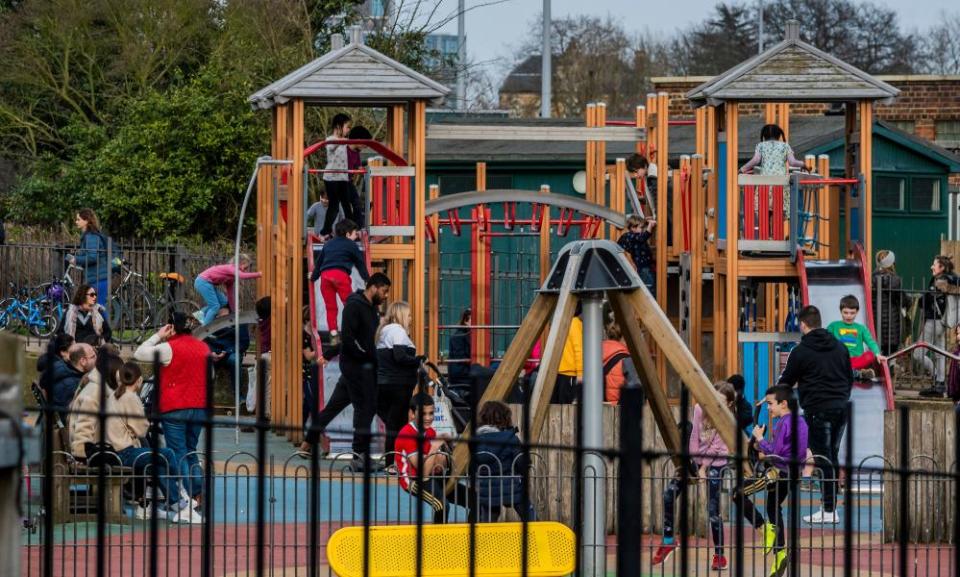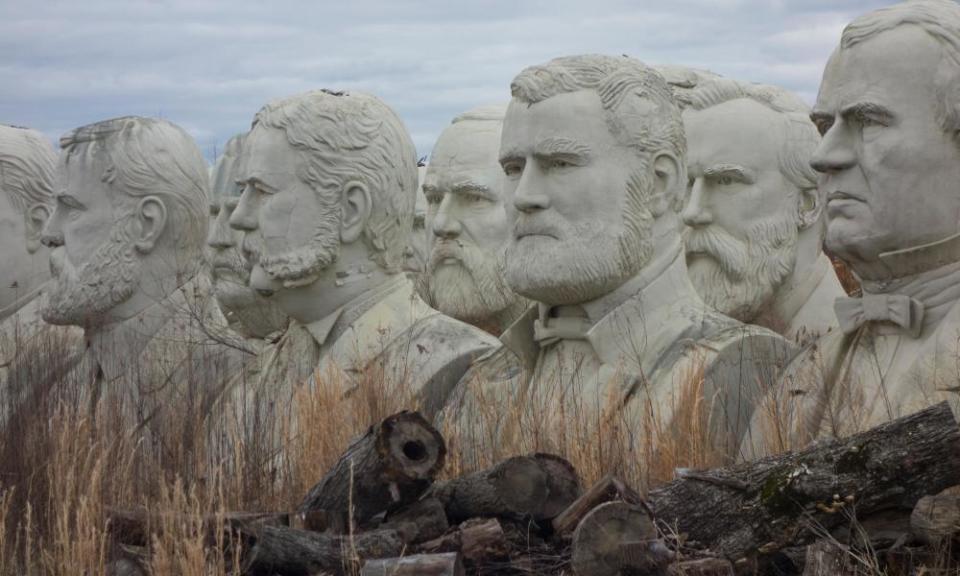Tuesday briefing: Playtime too late for British children

Top story: Children not learning to manage risk
Good morning, Warren Murray with your first taste of the news for Tuesday.
Primary-age children in Britain are typically not being allowed to play outside on their own until two years older than the previous generation were. Their parents played outside unsupervised by the age of nine – today’s children don’t get there until age 11, according to the study. One expert said the findings showed that British children had been subject to “a gradual, creeping lockdown over at least a generation”.
“In the largest study of play in Britain, we can clearly see that there is a trend to be protective and to provide less freedom for our children now than in previous generations,” said Helen Dodd, a professor of child psychology at the University of Reading, who led the study. “First, we are seeing children getting towards the end of their primary school years without having had enough opportunities to develop their ability to assess and manage risk independently. Second, if children are getting less time to play outdoors in an adventurous way, this may have an impact on their mental health and overall wellbeing.”
Anita Grant, the chair of Play England, said: “Adults’ protective instincts are not helpful when they restrict and control exploration, creativity and a child’s natural instinct to engage with their environment freely.” The study found children in Scotland were allowed out at the youngest age, a year before those in Wales and England.
* * *
Chauvin-Floyd verdict awaited – The jury has begun its deliberations in the murder trial of Derek Chauvin over the death of George Floyd. The courtroom in Minneapolis heard closing arguments on Monday. Chauvin, the police officer who kneeled on Floyd’s neck until he was dead, faces the possibility of conviction for either second or third-degree murder, and up to 40 years’ jail. The prosecutor, Steve Schleicher, said the key to the case lay in video footage of Chauvin pressing his knee on to Floyd’s neck right to his very last words of “‘I can’t breathe’ … This case is exactly what you saw with your eyes. It’s what you know in your heart.”
Chauvin’s lawyer, Eric Nelson, focused on whether the officer’s actions were “reasonable under the totality of circumstances”, as Floyd fought hard against getting into a squad car. “This was an authorised use of force, as unattractive as it may be. And this is reasonable doubt.” Tensions are high in Minneapolis ahead of the verdict, with hundreds of national guard soldiers deployed.
* * *
‘We have not been good enough’ – Amnesty International has a culture of white privilege with incidents including senior staff using the N-word and people touching black colleagues’ hair, according to an internal review into its secretariat. Eight current and former employees of Amnesty International UK (AIUK) have described their experiences and called on senior figures to stand down. One of the whistleblowers, Katherine Odukoya, said: “We joined Amnesty hoping to campaign against human rights abuses but were instead let down through realising that the organisation actually helped perpetuate them.” Representatives of both arms of the UK-based human rights organisation apologised and pledged to make changes, with the director of AIUK citing “the uncomfortable fact that we have not been good enough”.
* * *
CDU chooses Laschet – Armin Laschet, leader of Germany’s Christian Democrats (CDU), appears to have won the backing of senior party members to run as the conservative candidate succeeding Angela Merkel in September’s federal election. German news website DW reported that 77.5% of the party board – 31 members – voted in favour of Laschet with his rival, Markus Söder, receiving nine votes. Merkel, the German chancellor, is to step down after the election and pressure is mounting on the ruling alliance to agree on a candidate as its ratings wallow near a one-year low, hurt by chaotic handling of the Covid-19 pandemic.
* * *
Proud Boys behind bars – A federal judge has ordered two leaders of the far-right Proud Boys group be held in jail pending trial for involvement in the 6 January Capitol attack. They are Ethan Nordean of Washington state and Joseph Biggs of Florida. Meanwhile the Washington DC medical examiner’s office has ruled that police officer Brian Sicknick suffered a stroke and died of natural causes after confronting Capitol rioters. The finding makes it less likely that anyone will be charged in his death. Federal prosecutors have charged two men with using bear spray on Sicknick during the riot.
* * *
‘Level up the country’ – Mobile phone masts up to 30 metres tall, an increase of five metres, are to be allowed in the English countryside, the government has announced. The aim is to improve the signal and boost the rollout of 5G networks in rural communities. A stricter cap of 25 metres will apply in such places as national parks, areas of outstanding natural beauty (AONB) and world heritage sites. “We want to level up the country and end the plague of patchy and poor mobile signals in rural communities,” the digital secretary, Oliver Dowden, said. There are plans to allow building-based masts closer to main roads to improve signals for road users.
Today in Focus podcast: Hunt for the Covid variants
Since the pandemic began, a crack team of scientists has been working to track Covid variants as they appear, to try to stop them from spreading. The Guardian’s health editor, Sarah Boseley, has been speaking to some of them.
Lunchtime read: Whiteness – birth of a dangerous idea
Before the 17th century, people did not think of themselves as belonging to something called the white race. But once the idea was invented, it quickly began to reshape the modern world.

Sport
The UK government and football’s authorities have launched a counter-offensive against plans for a European Super League that threaten the entire structure of the club game. The Premier League’s “Other 14” clubs have reacted furiously to the plan and begun to brainstorm ideas that could derail it. The Guardian has uncovered an unpublished document in the hidden code of the league’s new website that seeks to justify the controversial breakaway by saying it will give fans “what they want”. Uefa’s president, Aleksander Ceferin, has insisted that players who join will be banned from World Cups and European Championships if the breakaway materialises. The league would destroy football as we know it, writes David Baddiel; while Barney Ronay writes it would destroy at a stroke the basic premise that has underwritten English football. And it could halt the growth of the women’s game, according to Suzanne Wrack. Liverpool manager Jürgen Klopp was among the many critics and was stung by the furious reaction of Leeds’ supporters towards himself and his team before the 1-1 draw at Elland Road.
Tottenham chairman Daniel Levy wants an attack-minded manager to replace José Mourinho, whom he sacked on Monday morning. Racecourses have observed a minute’s silence and jockeys wore black armbands after the announcement that 37-year-old amateur rider Lorna Brooke had died in hospital on Sunday following a fall from her mother’s horse at Taunton this month. John Higgins blamed the suffocating Crucible pressure for his poor performance despite battling his way into the second round of the World Snooker Championship with a 10-7 win over China’s Tian Pengfei. And the former Chicago Bulls star Scottie Pippen says his eldest son, Antron, has died at the age of 33.
Business
MSCI’s broadest index of Asia-Pacific shares outside Japan has gained 0.2%, swinging into positive territory after Chinese blue chips rose 0.13%. South Korea gained 0.4%. Japan’s Nikkei dropped 1.84% as the country grapples with a resurgence in Covid cases. Australia slipped 0.33% while Hong Kong fell 0.11%. The FTSE looks like opening pretty flat. A pound is worth $1.40 or €1.160 at time of writing.
The papers
There’s back-to-front coverage in the papers today – as in the subject matter that might normally be on the back page is instead on the front page. Moving on from that dire attempt at humour: the Guardian leads with “No 10 joins attacks on breakaway football plan”. The Times says “Prince joins the backlash over football Super League” – if Harry had joined with William, you could say the monarchy had put up its dukes … The same paper has “Travel ban on India ‘weeks too late’” – because the red-listing won’t come into force until Friday, during which interval there could be thousands of arrivals.
The Sun calls the Super League drama the “Great game robbery” and the Mail says “William cries foul on league of greed”. “A red card from Wills” says the Metro, which also shows Keir Starmer being berated by a pub landlord over his support for coronavirus restrictions.
“Duke: I share fans’ fears for football” is the Telegraph’s splash headline. “You’ll never go it alone” – nice try from the i but not quite there. The Financial Times sticks to what it knows best by crunching the numbers: “Super League football clubs to net €200m-€300m ‘welcome bonus’”. The spondulix comes courtesy of JPMorgan. The FT’s basement story is the government toughening targets on greenhouse gas cuts over the next 15 years.
Sign up
The Guardian Morning Briefing is delivered to thousands of inboxes bright and early every weekday. If you are not already receiving it by email, you can sign up here.
For more news: www.theguardian.com

 Yahoo Finance
Yahoo Finance 